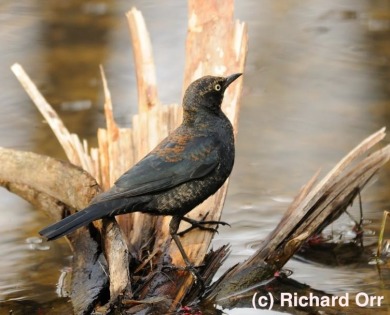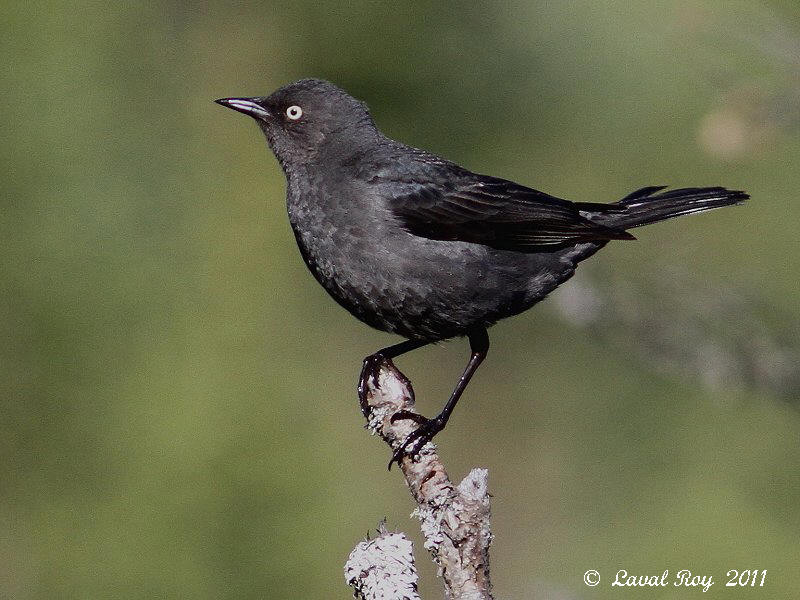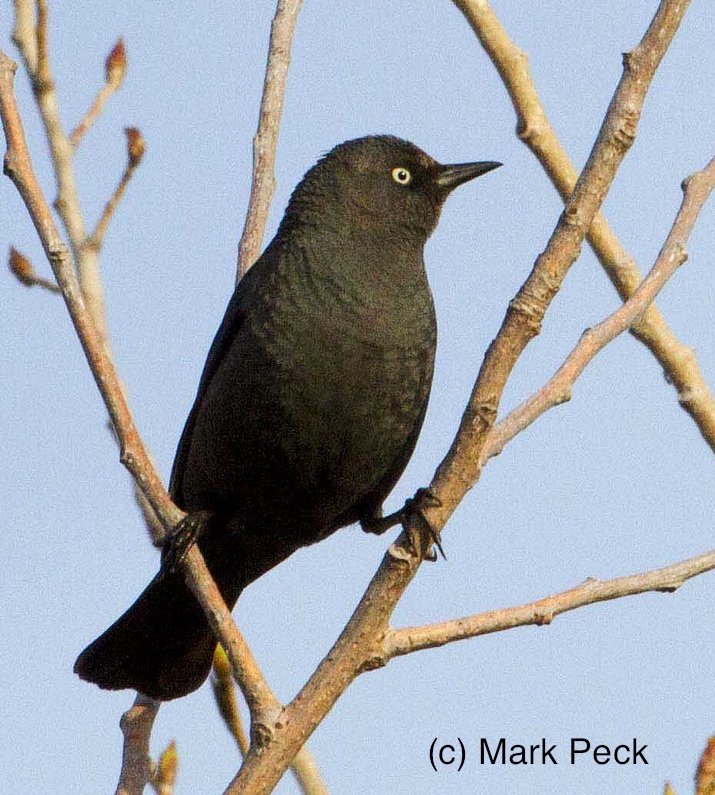 Have you heard a squeaky-hinge song lately, or seen a flash of rust-tipped feathers under a bright yellow eye? Once a common sight, particularly in the flooded forests of the Southeastern U.S. during winter, the Rusty Blackbird is becoming an increasingly rare find even for the most enthusiastic of birders. This species has suffered the most substantial population decline of any once-common landbird; up to 95% of the Rusty Blackbird population may have been lost over the last 50 years.
Have you heard a squeaky-hinge song lately, or seen a flash of rust-tipped feathers under a bright yellow eye? Once a common sight, particularly in the flooded forests of the Southeastern U.S. during winter, the Rusty Blackbird is becoming an increasingly rare find even for the most enthusiastic of birders. This species has suffered the most substantial population decline of any once-common landbird; up to 95% of the Rusty Blackbird population may have been lost over the last 50 years.
Until the last 20 years, few noticed, much less understood this decline. Rusty Blackbirds breed in boreal forest wetlands of the northeastern U.S. and throughout Canada to Alaska; these dense, muddy, buggy habitats are often remote and inaccessible to even the most persistent of humans. Their winter wooded wetland habitat often presents similar access difficulties. Compounding this challenge, blackbirds are often considered common and “resilient,” which may have caused the Rusties’ plight to be overlooked for many years.
 In the last two decades, research by members of the International Rusty Blackbird Working Group has illuminated many aspects of Rusty Blackbird basic ecology, especially for the breeding and wintering seasons. However, as with many migratory songbirds, understanding of Rusty Blackbird migration lags behind knowledge of other life phases. Are there hot spots where many individuals congregate during migration, and are those hot spots protected? How consistent is the timing of Rusty Blackbird migration? Answering these questions will allow us to more effectively target our conservation initiatives to protect this vulnerable songbird.
In the last two decades, research by members of the International Rusty Blackbird Working Group has illuminated many aspects of Rusty Blackbird basic ecology, especially for the breeding and wintering seasons. However, as with many migratory songbirds, understanding of Rusty Blackbird migration lags behind knowledge of other life phases. Are there hot spots where many individuals congregate during migration, and are those hot spots protected? How consistent is the timing of Rusty Blackbird migration? Answering these questions will allow us to more effectively target our conservation initiatives to protect this vulnerable songbird.
To increase our understanding of Rusty Blackbird migratory patterns, and to increase awareness of Rusty Blackbirds and their plight, VCE biologist Dr. Judith Scarl is coordinating an international initiative to track this vulnerable songbird. On March 1, 2014, the International Rusty Blackbird Working Group, in partnership with VCE, the US Fish and Wildlife Service, eBird, and several other federal, state, and non-profit organizations, will launch a Spring Migration Blitz that challenges birders to seek and report Rusty Blackbirds throughout their migratory range. The Rusty Blackbird Spring Migration Blitz will engage birders across 38 U.S. states, 9 Canadian provinces, and 3 Canadian territories to scour their local regions for Rusties during the species’ northward migration. From the beginning of March, when Rusties leave their southeastern wintering grounds, through the middle of June, when they arrive at their most distal breeding grounds in northern and western Canada, birders will search for Rusty Blackbirds… wherever they may be.
 Since the Blitz spans such a broad geographic region, each participating state and province is assigned target dates during which local birders should focus their search efforts. VCE and the IRBWG have created resources that will help birders identify Rusty Blackbirds and target their searches, and state and provincial coordinators can provide additional guidance and suggestions for where to search. During the Blitz period, we encourage birders to bird as they normally do, and report their survey efforts to eBird using the survey type “Other- Rusty Blackbird Spring Migration Blitz.” Since we’re just as interested in where birders don’t find Rusties as where they do, we encourage birders to report all of their survey efforts, even if they didn’t detect the target species.
Since the Blitz spans such a broad geographic region, each participating state and province is assigned target dates during which local birders should focus their search efforts. VCE and the IRBWG have created resources that will help birders identify Rusty Blackbirds and target their searches, and state and provincial coordinators can provide additional guidance and suggestions for where to search. During the Blitz period, we encourage birders to bird as they normally do, and report their survey efforts to eBird using the survey type “Other- Rusty Blackbird Spring Migration Blitz.” Since we’re just as interested in where birders don’t find Rusties as where they do, we encourage birders to report all of their survey efforts, even if they didn’t detect the target species.
Our Rusty Blackbird Spring Migration Blitz Facebook page has up-to-the-minute information about Blitz progress; with opening day only a month away, stay tuned for the latest updates, announcements, and resources. Brush up on your identification skills and get ready to start your search; everyone is encouraged to participate in this international initiative to understand and conserve a much-overlooked songbird.
